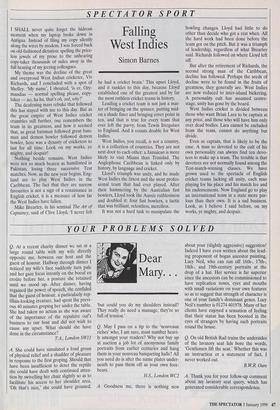SPECTATOR SPORT
Falling West Indies
Simon Barnes
I SHALL never quite forget the hideous moment when my laptop broke down in Antigua. Instead of filing my copy silently along the wires by modem, I was forced back on old-fashioned dictation: spelling the price- less jewels of my prose to the unhearing copy-taker thousands of miles away in the full hearing of my jeering colleagues. My theme was the decline of the great and overproud West Indian cricketer, Viv Richards, and I concluded with a spot of Shelley. 'My name', I shouted, 'is er, Ozy- mandias — normal spelling please, copy- taker — no, ha ha, that's oh, zed, why?' The deafening mass rebuke that followed this has stayed with me to this day. But as the great empire of West Indies cricket crumbles still further, one remembers the team in its greatness, and how it seemed that, as great batsman followed great bats- man and demon bowler followed demon bowler, here was a dynasty of cricketers to last for all time. Look on my works, ye mighty, and despair! Nothing beside remains. West Indies were not so much beaten as humiliated in Pakistan, losing three successive Test matches. Now, as the new year begins, Eng- land are to play West Indies in the Caribbean. The fact that they are narrow favourites is not a sign of a renaissance in English cricket, it is a measure of how far the West Indies have fallen.
Mike Brearley, in his seminal The Art of Captaincy, said of Clive Lloyd, 'I never felt he had a cricket brain.' This upset Lloyd, and it rankles to this day, because Lloyd established one of the greatest and by far the most ruthless cricket teams in history.
Leading a cricket team is not just a mat- ter of bringing on the spinner, putting mid- on a shade finer and bringing cover point in ten, and that is true for every team that ever left the pavvy, from Tewin Irregulars to England. And it counts double for West Indies.
West Indies, you recall, is not a country, it is a collection of countries. They are not next door to each other: a Jamaican is more likely to visit Miami than Trinidad. The Anglophone Caribbean is linked only by history, by language and cricket.
Lloyd's triumph was unity, and he made West Indies the fittest and the most profes- sional team that had ever played. After their hammering by the Australian fast bowlers, Lloyd took the Aussie ruthlessness and doubled it: four fast bowlers, a tactic that was brilliant, relentless, merciless.
It was not a hard task to manipulate the bowling changes. Lloyd had little to do other than decide who got a rest when. All the hard work had been done before the team got on the pitch. But it was a triumph of leadership, regardless of what Brearley said. Richards followed on where Lloyd left off.
But after the retirement of Richards, the second strong man of the Caribbean, decline has followed. Perhaps the seeds of decline were to be found in the fruits of greatness, they generally are. West Indies are now reduced to inter-island bickering. A personality cult has assumed centre- stage, unity has gone by the board.
West Indies cricket is divided between those who want Brian Lara to be captain at any price, and those who will have him only over dead bodies. Lara cannot be excluded from the team, cannot do anything but divide.
Even as captain, that is likely to be the case. A man so devoted to the cult of his own personality can always find ten devo- tees to make up a team. The trouble is that devotees are not normally found among the Test-match-winning classes. We have grown used to the spectacle of English cricket teams lacking all unity, each man playing for his place and his match fee and his endorsements. Now England go to play an international team in a state more par- lous than their own. It is a sad business. Look, as I believe I said before, on my works, ye mighty, and despair.


















































 Previous page
Previous page